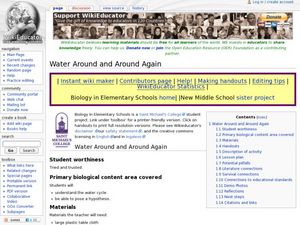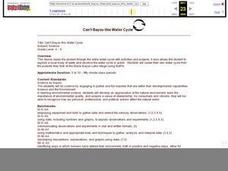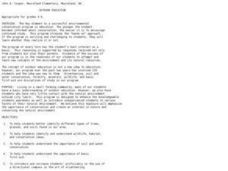Curated OER
Water Management in Florida
Students discuss water management. They examine the water management districts in their area. They complete an experiment in which they role-play a water management manager.
Curated OER
Ways We Use Water
Fourth graders write a persuasive paper after a demonstration about the properties of water and how they work. The lesson also uses a mind map to outline the paper.
Curated OER
Water Quality
In this unit of lessons, 2nd graders examine the water quality of the water on the planet. They discover how much water is on the planet and how to conserve their water usage.
Curated OER
Water Pollution
Fifth graders examine what contaminated water looks like, and how it becomes polluted. They examine a teacher demonstration of water is not polluted but does contain rocks and other things that do need to be cleaned out before drinking...
Curated OER
Are You Thirsty: The Effects of Pollution on Drinking Water
Middle schoolers discuss the different causes of water pollution. In this ecology lesson, students brainstorm ways to purify polluted water. They formulate their conclusion based on the results of the experiments.
Curated OER
Water Around and Around Again
Young scholars form a hypothesis for a water cycle experiment. In this water cycle lesson plan, students create their own environment with water and earth to study the water cycle. Young scholars complete a handout to make a hypothesis...
Curated OER
Can't Bayou this Water Cycle
Students identify the stages in the water cycle. They observe a local water source and view the cycle in action. They create their own water cycle using software.
California Academy of Science
Fresh Solutions: Design Thinking Challenge
How do people transport fresh water long distances to ensure everyone has access to it? The final lesson in the 10-part Fresh Solutions unit encourages individuals to design their own solution, or solutions, to that very problem. Groups...
Outdoor Learning Center
Outdoor Survival
Which of the following can you survive without for the longest time: water, food, or a positive mental attitude? The answer may surprise you. Guide learners of all ages through games, activities, and discussions about surviving in the...
Disney
Where Do Brown Bears Live?
What do brown bears in Alaska's Katmai National Park need to survive? Pupils explore the unique habitats, diet, and survival needs of this animal. They predict the consequences of removing any integral part of the bear's survival, and...
NOAA
Marine Policy
Save the oceans! The 22nd installment of a 23-part NOAA Enrichment in Marine sciences and Oceanography (NEMO) program focuses on laws and marine policy. Pupils take part in an activity investigating fisheries stock data.
Texas State Energy Conservation Office
Investigation: Splitting Atoms
In a simple activity, physical scientists model nuclear fission using a droplet of oil. This can be used alone in a unit on different types of energy, or as part of the energy conservation unit produced by the Texas State Energy...
NOAA
Ocean Exploration
Sea explorers and scientists have found that because of temperatures being two to three degrees Celsius at the bottom of the ocean, most animals are lethargic in order to conserve energy. In this web quest, pairs of learners read about...
Curated OER
The Hudson's Ups and Downs
Even rivers have tides. Older elementary schoolers will discuss the Hudson River and how weather, water craft, and the ocean cause tidal fluctuation. They will examine a series of line graphs that depict tidal fluctuation, then analyze...
Curated OER
Turning the Tide on Trash: Marine Debris Curriculum
Seven pages of fascinating reading on marine debris preface the activities in this lesson plan. Four different activities are employed to simulate how the debris is distributed in the ocean and along beaches. Early ecology learners...
Curated OER
Environmental Responsibility
Young scholars discuss the importance of recycling and preventing pollution. In groups, they complete mini-studies on various environmental issues and evaluate different consumer products. They use global warming data to determine the...
Curated OER
Is That Natural?
Students examine how they use and waste natural resources. They participate in a class discussion about natural resources, in small groups complete a worksheet identifying ways students misuse natural resources, and create an...
Curated OER
Outdoor Education
Students increase their awareness of their natural environment. They engage in activities which emphasize the importance of conservation and create an interest in nature and conserving the natural environment.
Curated OER
Law of Conservation of Mass
Young scholars work in small groups. They grab a handful of ice, and place the ice in an empty beaker of ice using a triple beam balance. Students heat up the beaker of ice over a hot plat until the ice has changed into water. They...
Curated OER
Save the Earth: It's Everyone's Home!
Students research ways to conserve and reduce energy and resources. In this reducing waste lesson, students work in teams to experiment with water and losing resources. students brainstorm about ways to conserve and reduce energy and...
Curated OER
Treasures in Jeopardy
Learners compare and contrast deep sea coral reefs to shallow water reefs. In this coral reef lesson students develop a poster that could be used to educate the public about the importance of coral reefs.
Curated OER
Piece Like a River
Students investigate water formations by creating a puzzle. In this water properties instructional activity, students create a giant river puzzle by drawing on large butcher paper as a class, then dividing the image up into many...
Curated OER
Sense Of Place
Young scholars study ecology, listen to speakers and research conservation topics. In this investigative lesson students discuss wilderness resources, learn about Native Americans and participate in activities that help them to better...
Curated OER
Watershed Model
Students view a presentation of water and land and how we need to protect our water resources. In this water lesson plan, students discuss how we rely on water, and complete activities in all subjects related to water.

























